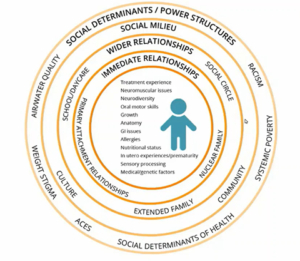Mealtimes can often be stressful for some parents and when a child refuses food or demands alternative meals, parents may become frustrated or concerned that their child is not eating enough.
When children with feeding problems come to see a dietitian, it’s important to take a “whole of child approach”. This means taking into consideration all body systems, but also larger factors such as culture, family, their school environment, and community. Feeding problems are often affected by many things, some of which may be out of the family’s control. Youthrive Dietitian Stella Boyd-Ford say there is no “one size fits all” solution to feeding problems, and treatment must be tailored to every family.
How do dietitians navigate this?
Dietitians navigate feeding problems first by ensuring that children are meeting nutritional requirements in creative ways. This might mean finding ways to fortify preferred foods, introducing high energy and protein supplements, or increasing volume of preferred foods. Whilst doing this, we work with families to address other changeable factors to improve intake. Usually this involves exploring ways to identify and increase a child’s internal motivation to eat.
“Ultimately, we want children to want to eat, not to make kids eat. Internal motivators for children to eat include comfort, curiosity, taste, hunger, and togetherness. After this, the child may require sensory based or oral motor skill-based therapies to gain confidence to explore foods,” says Emily Eastman, Dietitian Youthrive
At Youthrive our dietitian’s overall goal is for children to be well nourished and enjoy eating.
It is common for children to be picky about the foods they eat. It is also common for children to like one food one day and not the next, refuse to try new foods and eat more or less food from day to day. Choosing what or what not to eat is a normal part of children’s development as they explore their environment and learn to assert their independence.
Some tips to support children to learn to eat a variety of foods include:
- Eat together as a family – when you eat together with your child you are modelling healthy eating habits and helping them learn about different foods.
- Keeping a routine – try to avoid grazing or frequent snacks by offering meals and snacks at regular times, this encourages a better appetite at mealtimes.
- Always offer new foods with a food your child already enjoys eating
- Take your child’s lead; let them explore new foods in their own time and avoid any pressure
While many children will become less picky as they get older, some children may continue to find it difficult to try new foods. If your child eats only a few foods or seems to have a small appetite, they might not be getting the nutrients they need. If you have concerns about your child’s growth or feeding its best to speak with a dietitian for individual, tailored advice.
Eating together can be a great opportunity to connect and focus on the experience and enjoyment of a shared mealtime. Happy family mealtimes are important for the social, nutritional and developmental wellbeing of your family. Eating together also gives children the opportunity to learn about food, when children see us eating a wide variety of foods, they are more likely to learn to eat them too!

Top reasons why family mealtimes are important:
- Parents & Carers can role model positive eating behaviours
- Children learn to eat by watching their siblings and parents
- There are more opportunities to introduce and try new foods
- Distractions such as TV and iPad are less likely to be used
- They encourage children to learn to recognise hunger and fullness cues
- Children can be more involved in food preparation and mealtime activities such as setting the table
They encourage conversation and positive family interactions
If you’re concerned about your child’s eating habits, you can book online to see one of our amazing dietitians at Youthrive.

Whole of child approach to feeding diagram
(Jo Cormack and Katja Rowell, n.d., All of Me: Considering the Whole Child in Responsive Feeding Therapy, Responsive feeding foundation series)
Authors: Dietitian’s Stella Boyd-Ford and Emily Easman



